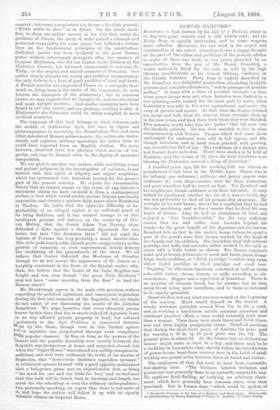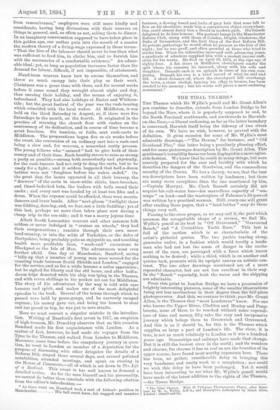SAMUEL BAMFORD.* BAarronn is best known by his Life of
a Radical, which in its day won great renown, and is still widely read ; but his Early Days is equally interesting, and in some respects more valuable. Moreover, the one work is the sequel and continuation of the other ; wherefore it was a happy thought on the part of the editor and publisher of the present edition to make of them one book, in two parts, preceded by an introduction from the pen of Mr. Henry Dunckley, a writer eminently fitted for the task, as well by his high literary qualifications as his almost lifelong residence in the County Palatine. Early Days is rightly described by Mr. Dunckley as a delightful production, abounding in idyllic pictures and romantic adventures, " and in passages of genuine pathos." It deals with a time of peculiar interest,—a time when power-looms were not, when factories were limited to a few spinning-mills, turned for the most part by water, when Lancashire was still in the main agricultural, and under the sway of parson and squire. At that time the weaver fetched his warps and weft from the nearest town, wrought them up in his own home, and took them back when they were finished. Five minutes would take him into paths "that led soon into the loveliest solitude. He was thus enabled to live in close companionship with Nature. Usages which had come down unchanged for centuries were still in full vigour, and life, though laborious, and in hard times pinched with poverty, was nevertheless full of joy. The traditions of a distant time had floated down unbroken. There were stories to be told of Flodden ; and the events of '45, when the local Jacobites were blessing the Pretender, seemed a thing of yesterday."
A hundred years ago, life for working folk was almost as primitive as it had been in the Middle Ages. Steam was in its infancy, gas unknown ; railways and penny papers were undreamt of; even stage-coaches were far from numerous, and poor travellers had to travel on foot. Yet Bamford and his neighbours found existence more than tolerable. It may indeed be questioned whether the lot of a weaver in his day was not preferable to that of his present-day successor. He wrought in his own house; was so far a capitalist that he had his own machinery, and so far a master that he fixed his own hours of labour. Also, he had an abundance of food, and enjoyed a "free breakfast-table," for the very sufficient reason that tea and coffee were luxuries beyond his reach,—to the great benefit of his digestion and his nerves. Bamford tells us that in his uncle's house (where he spent a part of his youth) were four looms, worked by the head of the family and his children. For breakfast they had oatmeal porridge and milk, and oat-cake, either soaked in the milk or eaten with a little butter or cheese. For dinner, butcher's meat and potatoes, potato-pie or meat and broth, harm dump- lings, hasty-pudding, or "drink porridge,"—which may mean either liquid porridge or thick porridge and small beer. "Bagging," or afternoon luncheon, consisted of half an oaten cake with butter, cheese, treacle, or milk, according to cir- cumstances. Supper was a repetition of breakfast. There is no mention of wheaten bread, but its absence was no loss, oaten bread being more nutritious, and to those accustomed to it, equally palatable.
Bamford does not say what weavers earned at the beginning of the century. Much would depend on the weaver. A steady workman probably earned from 15s. to 20s. a week, and as working a hand-loom entails constant attention and continual physical effort, a man would naturally earn more than a woman. Then there were slack times and brisk times; now and then, highly prosperous times. Bamford mentions that during the short-lived peace of Amiens, the price paid for weaving a 26 in. by 28 yard piece was 10e. 6d. The present price is about 9d. At the former rate an industrious weaver might make at least 5s. a day; and there used to be a tradition in Lancashire that, shortly before the introduction of power-looms, hand-loom weavers were in the habit of sand- wiching one-pound notes between slices of bread and butter.
The employers of that day seem to have been reasonable, fair-dealing men. "The business betwixt workman and putter-out was generally done in an amicable, reasonable way. No captious fault-ending, no bullying, no arbitrary abate- ment, which have generally been common since, were then practised. But in former days, " which could be spoken of .1, Bamford's Paasayet in the Life of a Radical, and Early Days, Edited, with an Introduotion, by Henry Hnnokley ("Vella "). London: T. rishor from remembrance," employers were still more kindly and considerate, having long discussions with their weavers on things in general, and, as often as not, asking them to dinner. In an imaginary conversation supposed to have taken place in this golden age, our author puts into the mouth of a master the modern theory of a living-wage expressed in these terms : " That the hire of the labourer should never be less than what was sufficient to feed him, to clothe him, and to furnish him with the necessaries of a comfortable existence." An admir- able ideal; yet, so long as population increases faster than the demand for labour, difficult, if not impossible, of attainment.
Hand-loom weavers knew how to amuse themselves, and threw as much energy into their play as their work. Christmas was a great time with them, and for several weeks before it came round they wrought almost night and day, thus earning their holiday, and the means of enjoying it, beforehand. They had also holidays at Easter and Whitsun- tide; but the great festival of the year was the rush-bearing which coincided with the local wakes. At Middleton, it was held on the third Saturday in August, or, if there were five Saturdays in the month, on the fourth. It originated in the practice of strewing the church floor with rushes on the anniversary of its dedication, and in course of time became a great function. Six hamlets, or folds, sent rush-carts to Middleton. The preparations began five or six weeks before the event, the conversion of an ordinary cart into a rush-cart being a slow and, for weavers, a somewhat costly process. The young fellows who " entered " had to give both of their money and of their time. Each locality strove to raise as strong a party as possible,—strong both numerically and physically, for the rush-bearers had not only to drag the carts, but to be ready for a fight ; and it seldom happened that half-a-dozen battles were not " foughtett before the wakes ended." On the great day, the lasses appeared in all their bravery, the " drawers " of the carts in snow-white shirts, knee-breeches, and tinsel-bedecked hats, the leaders with bells round their necks ; and every cart was headed by at least two fifes and a drum. When the expense could be afforded, there were morris- dancers and brass bands. After " neet- gloom " (twilight) there was fiddling, dancing, and, we fear, not a little fuddling; yet of this last, perhaps no more than takes place now during a -cheap trip to the sea-side ; and it was a merry joyous time.
Albeit South Lancashire weavers and other common folk seldom or never indulged in " cruises on wheels," they had their compensations ; rambles through their own moor- land country, or into the wilds of Yorkshire, or the dales of Derbyshire, being probably quite as enjoyable as, and touching health more profitable than, week-end" excursions to Blackpool or the Isle of Man. The adventurers went even further afield. One day at Manchester, Bamford, seeing "bills up that a number of young men were wanted for the coasting trade between South Shields and London," engaged for the service, and so for a while became a sailor apprentice ; but he sighed for liberty and the old home, and after half-a- dozen trips deserted while his ship was lying in the Thames, and with seven shillings in his pocket set out for Middleton. The story of his adventures by the way is told with rare humour and spirit, and makes one of the most delightful episodes in the book. Several of the towns through which he passed were held by press-gangs, and he narrowly escaped capture; his money gave out, and being too honest to steal and too proud to beg, he was put to sore straits.
Here we mist correct a singular mistake in the introduc- tion. Writing of Bamford's first arrest in 1817, on suspicion of high-treason, Mr. Dunckley observes that on this occasion Bamford made his first acquaintance with London. As a matter of fact, however, he had made six voyages from the Tyne to the Thames, and walked from London to Middleton. Moreover, some time before the compulsory journey in ques- tion, he went to London as member of a deputation for the purpose of discussing with other delegates the details of a Reform Bill, stayed there several days, met several polished notabilities, attended meetings, and 'spent an evening in the House of 000111103113,—all of Which is set down in The Life of a Radical. This event is too well known to demand a detailed notice. As for the man himself and his personality, we cannot do better than conclude with the following citation from the editor's introduction 2— "As time went on, Bamford took a sort of historic position in
Manchester His tall erect form, his rugged and massive features, a flowing beard and locks of grey hair that were left to flow on his shoulders, made him a conspicuous object everywhere. One could almost fancy him a Druid in modern garb. His friends delighted to do him honour. His portrait hangs in the Manchester Reform Club, along with those of Cobden, Bright, Gladstone, the Duke of Devonshire, and the Earl Grey of the first Reform Bill. At private gatherings he would often be present as the lion of the night ; but he was gruff, and often growled at those who tried to stroke him. When his infirmities iirreased with advancing years, a syndicate of admirers supplied him with a modest income suffi- cient for his wants. He died on April 13, 1872, at the ripe age of eighty-four. A fiat stone in Middleton churchyard marks the spot where his remains lie interred, along with his wife and daughter. Beneath each is an epitaph in verse of his own com- posing. Beneath his own is a brief record of what he said and did. A short distance off, where the churchyard hill overhangs the town, a stone obelisk, bearing his effigy in bronze, has been erected to his memory ; but his works will prove a more enduring monument."



































 Previous page
Previous page